#culturalism
Explore tagged Tumblr posts
Text
Reading Notes 1: Marx and Engels to Althusser to Benjamin
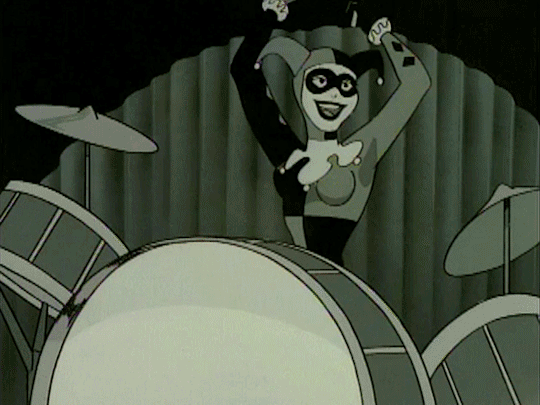
In “The Ruling Class and The Ruling Ideas,” “Ideology and Ideological State Apparatuses,” and “The Work of Art in the Age of Mechanical Reproduction,” Karl Marx and Frederick Engels, Louis Althusser, and Walter Benjamin, respectively, provide insight on our introduction to ideology and culturalism.
What is the division of mental and material labour and how does it manifest in society?
What is the relationship between the state apparatus and the ideological state apparatuses?
How have the processes of reproducing works of art changed over time, and how have changes in reproduction altered the relationship between a piece of art and its “original” object?
@theuncannyprofessoro
20 notes
·
View notes
Text
Levi Stine - Ideology and Culturalism II
“Bitch Better Have My Money”
youtube

Rihanna’s Bitch Better Have My Money, first and foremost, puts money at the center of human motivation. The entire concept of the video’s narrative is for Rihanna’s protagonist to obtain the money owed to her. Observing this work through the eyes of Horkheimer and Adorno, it is clear that this perpetuates the idolization of money in the culture industry. “Their ideology is business”,(1) and the ideology of this video drives the business of both the music industry and the culture industry. Horkheimer and Adorno claim that “the only escape from the work process is adaptation to it in leisure time.”(2) Viewers of this video consume a barrage of capitalistic ideals, most poignantly the way in which the kidnappers live in luxury because of their dirty, violent work. Much of the video takes place on their yacht (2:48-3:28), a testament to their wealth. The culture industry also seems to be represented by Rihanna herself. She is an unstoppable force that has come to take what’s hers, parallel to the irresistibility of the culture industry and how no one can survive without being roped into it.(3) Horkheimer and Adorno also claim that the media of the culture industry creates an illusion that is believed to still be connected to the real world,(4) and the normalization of such violence in the video can have a negative effect on viewers. Rihanna and her team of kidnappers perpetuate Horkheimer and Adorno’s notion of the all-consuming culture industry, an industry that worships money and the hard labor falsely-cited as required in order to obtain it.

Signs are in effect all throughout Bitch Better Have My Money, and are often subverted throughout the narrative. Stuart Hall states how denotation is controlled by the sign sender, while connotation, the reception of the message by the individual, is subject to numerous external factors. (5) The video opens (0:08-0:20) with a woman's legs sticking out of a wooden chest. Then, a woman is introduced in a lavish home with a formal dress and shiny earrings (0:21-0:31), denoting wealth while connoting, within the context of the story, money that has been immorally-obtained. As the narrative of the story progresses and the rich woman remains held hostage, the viewer assumes that she is the one who will end up in the chest, that she is the “bitch” who “better have my money.” The video twists this on its head with the introduction of Mads Mikkelsen’s “The Accountant” (5:21), as well as the backstory of the situation, switching the connotation of Rihanna’s actions from seeming like senseless torture to being perceived as a powerful resistance against an evil man who wronged her. Hall claims that the process of encoding and decoding requires a means and a relation for social production, (6) a context for the sign to be put in. BBHMM, a hit song by a woman in an industry historically dominated by men, mirrors the female empowerment that the video displays in the climax of the narrative. The final shot of the video reveals Rihanna herself as the woman in the chest (6:02-6:37). She’s naked, smoking a cigarette, and covered in money and blood. The visual denotes the mutilation of The Accountant and a rightful repossession of funds. More intuitively, the phallic imagery of the cigarette in her mouth and her nudity, as well as the nudity present throughout the video, connotes a sort of sexual power and domination to the narrative. When the topless hostage signified vulnerability, while the final shot provides Rihanna with an upfront strength and badassery.
Discussion Questions:
How do you think the culture industry’s perspective on money would change if creation within the industry itself wasn’t so lucrative?
In what ways would Rihanna change the signs in her video if she wanted to portray herself as the antagonist, and the hostages as the protagonists?
“Radio Ga Ga”
youtube
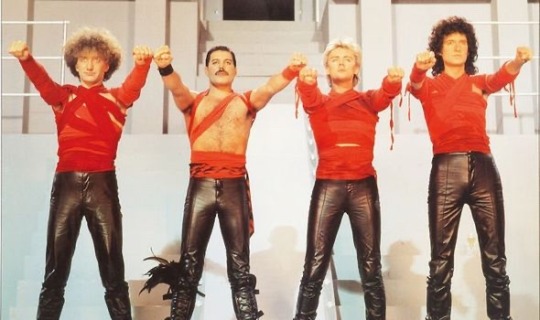
Queen’s music video for their 1984 hit “Radio Ga Ga” details the inner workings of the culture industry in true dystopian fashion, exaggerating the role of technology in our lives in order to reflect on how we use it. Horkheimer and Adorno believe that “culture today is infecting everything with sameness.” (7) Queen exemplifies this fear in a sequence that occurs during the first and second chorus (2:12-2:38 and 3:37-4:01), in which the four band members, dressed in red, rally a mass of people, dressed all in white. Queen extends a salute and the crowd echoes it. This sequence represents a society ruled by radio (“All we hear is/Radio ga ga”), conforming and oppressive. This is a scenario in which “ideology becomes the emphatic and systematic proclamation of what is,” (8) causing nothing new or creative to emerge from this fictional modern-day society. The video puts radio at the root of the future’s problems, but at the same time, radio is praised for having been so simple. The concept of a music video being nostalgic about a time in which only radio existed is a contradictory example of Horkheimer’s and Adorno’s belief that within the culture industry, the message of a work emerges from the same school of thought as the lens through which people receive it. (9) Music lovers will watch this video and further praise a technology that innovated music listening (this connection only strengthens as time goes on and nostalgia for the music video itself increases).
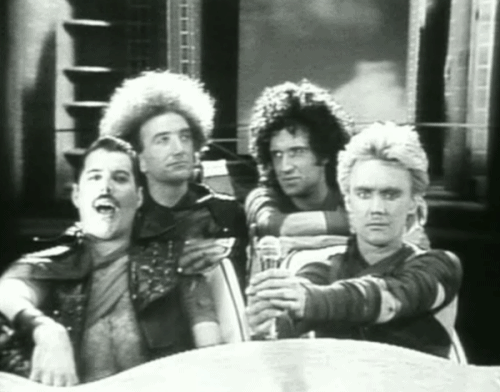
The “Radio Gaga” music video effectively uses visual signs to convey their anti-dystopian message. Hall cites Barthes’ notion that the connotation of the signifiers given to audiences is closely linked to the audience’s culture. (10) In the 1980s, music videos were incredibly popular, and they were an example of the many technological advancements brought on by the decade. The futurism of this video’s world, at the time of the video’s release, may have been met with celebration and excitement, while in the “postmodern” age we live in now, the video is understood to be a warning against technological domination. This video may now serve as an example of how the connotation of an encoded message can be changed over time. Further details within the video act as signs, outlining their process and function in digital media. As previously mentioned, the image of the band in red rallying and controlling the masses in white (2:12-2:38 and 3:37-4:01) connotes government/state control, as those colors are reminiscent of many harsh dictatorships throughout history. The use of clips from the german film Metropolis (1927) in the beginning of the video (0:00-0:31) shows a parallel between this video’s message and the fear of technological dystopia that is present in other important forms of media in other countries. As someone previously familiar with the film, I assumed what Hall defines as a “negotiated code” when I viewed the video, in that I understood what had been “dominantly defined” because the video presented situations and events which were “in dominance”, that I understood. (11)
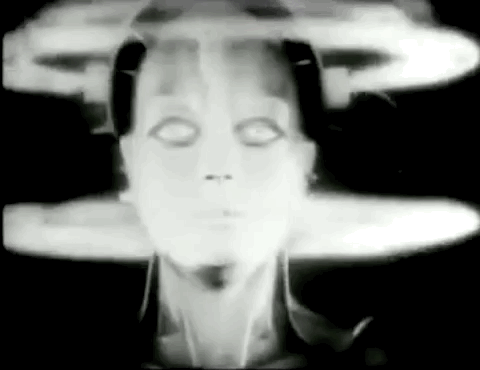
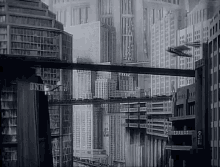
Discussion Questions:
What are some other ways in which technological advancement has increased the scope of the culture industry?
How do you think that the globalization of information has contributed to the reception of media through “negotiated code”? What sort of dystopia would Queen be fearing if they created this video today?
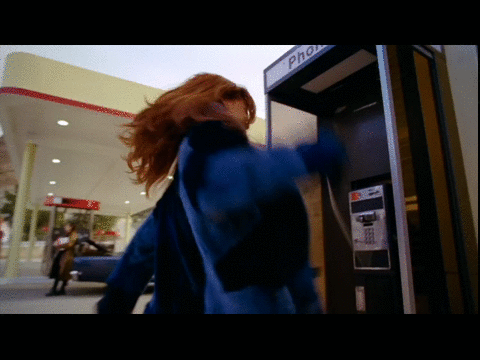
1 Max Horkheimer and Theodor Adorno, “The Culture Industry: Enlightenment as Mass Deception,” in Dialectic of Enlightenment (California: Stanford University press, 2002), 109
2 Horkheimer and Adorno, The Culture Industry, 109
3 Horkheimer and Adorno, The Culture Industry, 104
4 Horkheimer and Adorno, The Culture Industry, 99
5 Stuart Hall, “Encoding, Decoding,” in The Cultural Studies Reader (London: Routledge, 1993), 513
6 Hall, Encoding, Decoding, 508
7 Horkheimer and Adorno, The Culture Industry, 94
8 Horkheimer and Adorno, The Culture Industry, 118
9 Horkheimer and Adorno, The Culture Industry, 102
10 Hall, Encoding, Decoding, 513
11 Hall, Encoding, Decoding, 516
@theuncannyprofessoro
8 notes
·
View notes
Text
Reading Notes 1: Marx and Engels, Althusser, Benjamin
When we think of division of labor, we are typically thinking of the division of material labor specifically. The notion that there’s a proletariat or working class who work for the bourgeoisie and earn from wages, while the bourgeoisie or ruling class controls, and earns from the control, of the means of production. Marx and Engels argue that this division of material labor also lends itself to the division of mental labor. The ruling class creates the ideologies that govern society as a whole. It’s important to note that these ideologies don’t exist independently and are specifically designed to keep the working class docile and legitimize the current ruling class. This often comes subtly in the form of everyday media. Specifically right now in the United States I think of the general values of self-determination or the “grind”, often suggesting that people who aren’t successful simply aren’t working hard enough.
Althusser claims that the State Apparatus is more accurately a Repressive State Apparatus that functions by violence and repression. This includes things like the government, army, police, courts, and prisons, all of which are public, and ultimately form a single entity. Alongside the RSA are the Ideological State Apparatuses, including the religious, educational, political, communications, and cultural ISAs. When we say educational ideological state apparatus for example, we refer to both public and private education systems. The cultural ISA would refer to everything literature, art, sports, etc. In contrast with the RSA, ISAs are often private, and most importantly, function by ideology as opposed to violence. Althusser notes that beyond all ruling by ideology, ISA’s are more specifically united in that their ideologies all ultimately fall under the ruling ideology. Thus, despite their differences, both the Repressive State Apparatus and Ideological State Apparatuses ultimately work together to achieve the same end of maintaining the status quo and reproducing the same class inequalities.
For most of our history, art has been replicable, but only in the sense that an artist could try their best to imitate an original work, like an apprentice learning from their teacher. There were bound to be differences. Much of what gives a work of art its value is its singularity. Being from one specific artist from one specific time and place, and with only one existing. However, through various technological innovations, we have gotten to the point where we can reproduce nearly any piece of art. Benjamin names things like lithography to printing to photographs, films, and recordings. For lack of a better phrase, this near identical reproduction simply makes many works of art not very valuable anymore. Furthermore, it makes art less traditionally or culturally significant - when, where, and how a piece of art was used or perceived is no longer an important part of its history, as now there are tons of identical pieces in an exponentially different amount contexts. This “[denies] any social function of art” leaving it to be used instead for politics.
2 notes
·
View notes
Text

the average twitter vs tumblr community experience
#being on both simultaneously is a harrowing experience#what do you mean I tweet about something else one time and lose 5 followers#twitter#xitter#tumblr culture#tumblr vs twitter#mutuals#oomf
133K notes
·
View notes
Text


Join me on my journey to finally unbalance my hormones, toxify my body, boost my inflammation, maximize my cortisol and absolutely destroy my gut health.
64K notes
·
View notes
Text
actually that no punctuation plot hole ooc wattpad fanfic written by that 12 year old will ALWAYS be better than character ai. and i love that 12 year old btw
#thank youuuu#in fact the thought of wattpad warms my heart. I hope that culture never goes away#text#*
74K notes
·
View notes
Text

calm down guys, it's only the 8th
#you're gonna blow our cover if you keep posting about grabbing knives. he's gonna get suspicious#15th march#march 15th#julius caesar#et tu brute#the ides of march#ides of march#tumblr culture#beware the ides of march
38K notes
·
View notes
Text
sorry i cant hang out i forgot how to mimic human like behaviour
#bpd blog#bpd fp#bpd mood#bpd problems#bpd shit#bpd stuff#bpd thoughts#bpd vent#actually bpd#bpd#borderline pd#borderline things#borderline problems#living with borderline#borderline blog#borderline thoughts#being borderline#borderline culture is#actually borderline#borderline personality disorder#bpd feels#bpd safe#bpd culture is
156K notes
·
View notes
Text
Reading Notes 2: Horkheimer and Adorno to Hall

Max Horkheimer and Theodor Adorno in “The Culture Industry as Mass Deception” and Stuart Hall in “Encoding, Decoding” continue our exploration of ideology and culturalism.
What makes the culture industry an industry, and how does the technology of the culture industry become a rationality of domination?
What is encoding, what is decoding, and what is the distinction between discourse and language?
@theuncannyprofessoro
14 notes
·
View notes
Text
Y'all
Im not on tiktok and never have been, but I downloaded RedNote just to see what is up, and I am witnessing something truly amazing
The Chinese user community is giving the American tiktok refugees an overwhelmingly warm welcome, meanwhile the American users seem to have collectively agreed that not only will they not let the app be taken over with English and they will provide Mandarin subtitles for everything, they are LEARNING MANDARIN. Ive scrolled through so many videos of Americans offering greetings in Mandarin to try to acclimate to the new environment and be respectful, and speakers of both languages are posting lots of tutorials on language basics and internet slang in Mandarin
My God, there is an AMAZING outpouring of curiosity and delight among everyone to learn about each others cultures and daily lives. People are posting videos of landscapes, cities, towns, and natural areas in USA and China, posting recipes and traditional foods, vlogs of everyday life, and reaching out to find people with similar hobbies.
And it's not just young people! There are loads of videos from middle-aged American guys who have come to post about fishing or motorcycles and are now happily chatting with Chinese users sharing the same interests using Google translate
One American guy who was like. in his 60's had a comment on one of his videos that was like "Red Neck?" and he replied "Yes!" and I just about fucking lost it
Also the Chinese users love, and I mean LOVE, Luigi Mangione. He is apparently broadly adored in China. There is SO much fanart and SO many edits.
There are many threads initiating Chinese users to ask questions of American users about the USA, and vice versa, and everyone on both sides is clearing up a lot of misconceptions. Some of the questions I saw a lot from Chinese users were: "Is it true that American parents kick you out of the house as soon as you turn 18" (not often, but sometimes) "Do you all really wear shoes in bed" (NO!!! Apparently a lot of characters in American sitcoms are shown lying in bed with shoes on which I never noticed before!) and "are there really guns everywhere" (yes).
For the most part Chinese content creators seem just overwhelmed by the sudden influx of hundreds of followers that are super enthusiastic about what they're doing. A lot of them have made posts about how initially they thought the uptick in follower count was some kind of error, or that there was some kind of joke or prank, but then they realized the interest and enthusiasm was genuine and now they're welcoming all the newcomers.
I found several posts by Chinese users saying that this felt like a really profound historical moment, where these previously separated worlds are suddenly smashing together and suddenly there is freedom to learn about each other's cultures and connect. One of them said something along the lines of "This is a 21st century Tower of Babel and even though I'm an atheist I hope God lets this tower stand." OUGH MY HEART.
The app itself works a little bit like a video-based version of Pinterest. It's not really my thing so I probably won't be on there long term but it's been amazing to see what's happening.
49K notes
·
View notes
Text
i think the near-extinction of people making fun, deep and/or unique interactive text-based browser games, projects and stories is catastrophic to the internet. i'm talking pre-itch.io era, nothing against it.
there are a lot of fun ones listed here and here but for the most part, they were made years ago and are now a dying breed. i get why. there's no money in it. factoring in the cost of web hosting and servers, it probably costs money. it's just sad that it's a dying art form.
anyway, here's some of my favorite browser-based interactive projects and games, if you're into that kind of thing. 90% of them are on the lists that i linked above.
A Better World - create an alternate history timeline
Alter Ego - abandonware birth-to-death life simulator game
Seedship - text-based game about colonizing a new planet
Sandboxels or ThisIsSand - free-falling sand physics games
Little Alchemy 2 - combine various elements to make new ones
Infinite Craft - kind of the same as Little Alchemy
ZenGM - simulate sports
Tamajoji - browser-based tamagotchi
IFDB - interactive fiction database (text adventure games)
Written Realms - more text adventure games with a user interface
The Cafe & Diner - mystery game
The New Campaign Trail - US presidential campaign game
Money Simulator - simulate financial decisions
Genesis - text-based adventure/fantasy game
Level 13 - text-based science fiction adventure game
Miniconomy - player driven economy game
Checkbox Olympics - games involving clicking checkboxes
BrantSteele.net - game show and Hunger Games simulators
Murder Games - fight to the death simulator by Orteil
Cookie Clicker - different but felt weird not including it. by Orteil.
if you're ever thinking about making a niche project that only a select number of individuals will be nerdy enough to enjoy, keep in mind i've been playing some of these games off and on for 20~ years (Alter Ego, for example). quite literally a lifetime of replayability.
85K notes
·
View notes
Text



115K notes
·
View notes
Text
I hate how people will look at popular indie artists who had one or two songs go viral on TikTok and start making fun of anybody who listens to them. "Oh you listen to Lemon Demon, Will Wood, Jack Stauber, Glass Animals, and Mother Mother? Tsk, don't you know that is stupid TikTok neurodivergent white transmasc preteen music? It's so mid and bad you should listen to real music–" you are a pit of misery
#sp-rambles#Edit: Head in hands and groaning why did this post become about cringe culture and “not caring about what other people think”#Like yes of course cringe culture is dead yada yada but don't you guys think it's a little off how people use ableist and queerphobic#rhetoric still to describe things they do not like? Isn't that a bit more concerning?
167K notes
·
View notes
Text
i think we should all start using arabic words and phrases more often because its a beautiful language and also theres not really. english equivalents that have the same vibes
theres also the comedy potential of it. you guys dont know the joy of having your muslim friend text you "hopefully the racists in our city will all get sick and cant go to the protest" and you, as a pasty white guy, responding with "inshallah they get covid"
its a one hit KO every time. its fucking hilarious. theres no english word that has the same effect.
he also once texted me that he got over a mysterious illness he came down with (i think? i cant remember the exact context) and i responded with "subhanallah he is cured"
again, one hit KO. he lost his shit.
what im saying is we gotta normalise arabic. its just a language like any other, and it has some great words. its just like saying "thank god" or whatever, but theres so much variety and nuance. its beautiful
63K notes
·
View notes
Text











Water Lilies painted by Claude Monet (1840 - 1926)
#art#art history#artwork#painting#history#culture#vintage#claude monet#impressionism#water lilies#water lily
56K notes
·
View notes